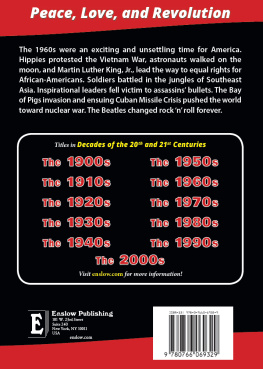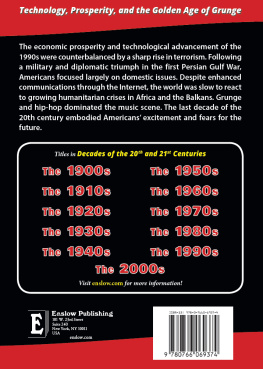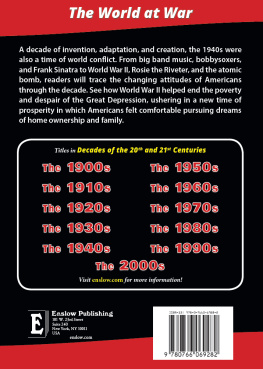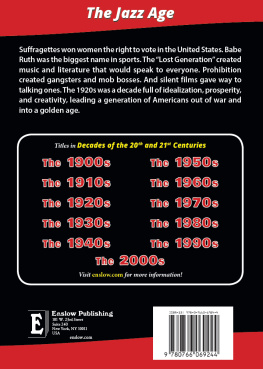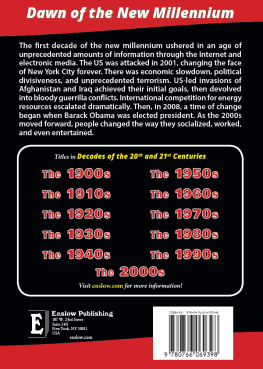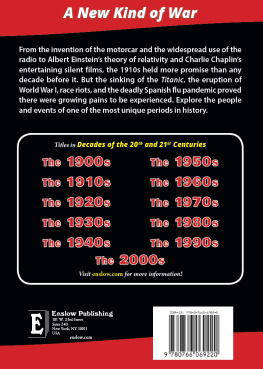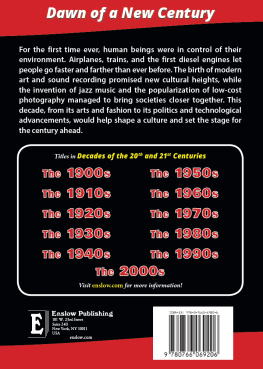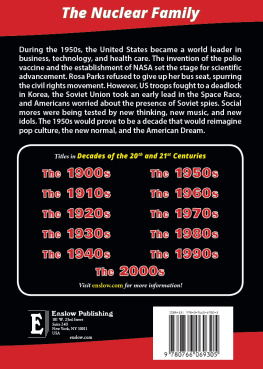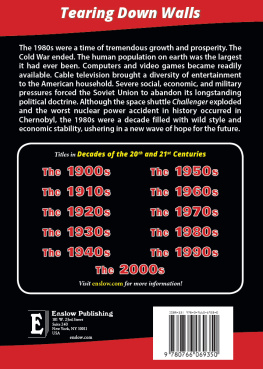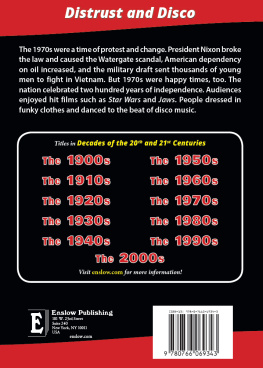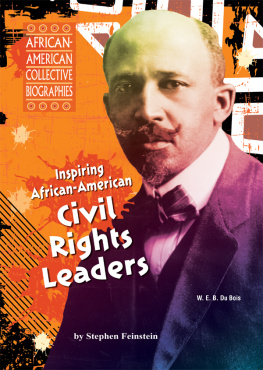Stephen Feinstein - The 1960s
Here you can read online Stephen Feinstein - The 1960s full text of the book (entire story) in english for free. Download pdf and epub, get meaning, cover and reviews about this ebook. year: 2015, publisher: Enslow Publishing, genre: Politics. Description of the work, (preface) as well as reviews are available. Best literature library LitArk.com created for fans of good reading and offers a wide selection of genres:
Romance novel
Science fiction
Adventure
Detective
Science
History
Home and family
Prose
Art
Politics
Computer
Non-fiction
Religion
Business
Children
Humor
Choose a favorite category and find really read worthwhile books. Enjoy immersion in the world of imagination, feel the emotions of the characters or learn something new for yourself, make an fascinating discovery.
- Book:The 1960s
- Author:
- Publisher:Enslow Publishing
- Genre:
- Year:2015
- Rating:3 / 5
- Favourites:Add to favourites
- Your mark:
- 60
- 1
- 2
- 3
- 4
- 5
The 1960s: summary, description and annotation
We offer to read an annotation, description, summary or preface (depends on what the author of the book "The 1960s" wrote himself). If you haven't found the necessary information about the book — write in the comments, we will try to find it.
The 1960s — read online for free the complete book (whole text) full work
Below is the text of the book, divided by pages. System saving the place of the last page read, allows you to conveniently read the book "The 1960s" online for free, without having to search again every time where you left off. Put a bookmark, and you can go to the page where you finished reading at any time.
Font size:
Interval:
Bookmark:


Published in 2016 by Enslow Publishing, LLC.
101 W. 23rd Street, Suite 240, New York, NY 10011
Copyright 2016 by Enslow Publishing, LLC.
All rights reserved.
No part of this book may be reproduced by any means without the written permission of the publisher.
Library of Congress Cataloging-in-Publication Data
Feinstein, Stephen.
The 1960s / Stephen Feinstein.
pages cm. (Decades of the 20th and 21st centuries)
Includes bibliographical references and index.
Summary: Discusses the decade 1960-1969 in the United States in terms of culture, art, science, and politics Provided by publisher.
Audience: Grade 9 to 12.
ISBN 978-0-7660-6932-9
1. United StatesCivilization1945-Juvenile literature. 2. United StatesPolitics and government1961-1963Juvenile literature. 3. United StatesPolitics and government1963-1969Juvenile literature. 4. Nineteen sixtiesJuvenile literature. I. Title.
E169.12.F4473 2015
973.922dc23
2015010948
Printed in the United States of America
To Our Readers: We have done our best to make sure all Web sites in this book were active and appropriate when we went to press. However, the author and the publisher have no control over and assume no liability for the material available on those Web sites or on any Web sites they may link to. Any comments or suggestions can be sent by e-mail to .
Photo Credits: Angelo Cozzi/Archivio Angelo Cozzi/Mondadori Portfolio via Getty Images, p..
Cover Credits: Francis Miller/The LIFE Picture Collection/Getty Images (Martin Luther King Jr.); John Dominis/The LIFE Picture Collection/Getty Images (Beatles); John Olson/The LIFE Images Collection/ Getty Images (Gloria Steinem); NASA/Wikimedia Commons/Astronaut Edwin Aldrin walks near the Apollo 11 Lunar Module (1969-07-20).tiff/public domain (moon landing).
Contents
Introduction
Pop Culture, Lifestyles, and Fashion
Entertainment and the Arts
Sports
National and International Politics
Advances in Science, Technology, and Medicine
Conclusion
Timeline
Glossary
Further Reading
Index
Introduction
The 1960s began with a tremendous burst of excitement and optimism. The youthful President John F. Kennedy said that America stood on the edge of a new frontier of progress and prosperity. He inspired idealism at his inauguration in 1961 when he said, Ask not what your country can do for youask what you can do for your country. Americans flocked to join the Peace Corps, volunteers who taught people in underdeveloped countries the skills necessary to make a better life for themselves. President Kennedy also set a difficult goal for the nations space program, which was to land Americans on the moon by the end of the decade. In 1969, American astronauts did land on the moon and return safely to earth. Americans greeted this achievement with pride. But the lunar landing was only a temporary distraction. By 1969, the United States was not a happy place.
The decade that had seemed so full of promise back in 1960 would end in confusion, anger, and despair. The 1960s were a time of great tensions in the world. The United States and the Soviet Union were locked in the bitter rivalry of the Cold War. The two countries did not fight each other directly, but they came dangerously close in 1962. If they had gone to war then, it might have spelled the end of the world. Both countries had thousands of nuclear weapons, and just one of these bombs could destroy an entire city.
Although they never went to war with each other, the Soviet Union and the United States supported opposing sides in many conflicts around the globe. One of these conflicts was in Vietnam, which was a war that turned out to be a long and painful struggle. As American soldiers were drawn into bloody combat in Vietnam, the United States became deeply divided over the war. Some people questioned why American troops were fighting and dying in Southeast Asia. They called for the soldiers to come home. Others insisted that the United States should fight in Vietnam until the war was won. All the while, television showed gory scenes of the fighting.
During the 1960s, Americans also saw disturbing violence in their own country. A president was shot and killed. As TV cameras rolled, his accused killer was murdered. Five years later, a presidential candidate was assassinated. So, too, was the countrys most famous civil rights leader.
The civil rights movement reached its peak in the 1960s. By 1960, African Americans no longer tolerated segregation laws that denied them their basic rights under the US Constitution. Their demands for equal treatment had grown into a national movement.
Young people were important to the civil rights movement. They also led a movement against the Vietnam War. Sometimes, their demonstrations turned violent. Americans saw many scenes of young people clashing with police on TV.
These clashes were just one sign of a deep split in American society during the 1960s. It was called the generation gap. During this time many young people rejected the beliefs and values of their parents. They defied authority and distrusted the government. Some of these young people were known as hippies. Recognizable by their long hair, colorful and unusual clothing, and drug habits, they spoke of peace, love, and flower power, or nonviolence. Hippies made up a small minority of young people and a small minority of people who protested during the 1960s. Still, the image of a hippie flashing a peace sign has become one of the most enduring symbols of that turbulent decade when it seemed the country was being torn apart.

The 1960s were a time of protest in America and around the world.
Pop Culture, Lifestyles, and Fashion
By the mid-1960s, the conservative, conforming style of 1950s America was left behind. Gone were the uniform of the gray flannel suit and proper dresses for women. The 1960s were a decade that celebrated youth, and young people dictated the trends.
Woodstock
In August 1969, thousands of young Americans headed for the little town of Bethel in Upstate New York. There, on Max Yasgurs sixhundred-acre dairy farm, they gathered for a three-day event known as the Woodstock Music and Art Fair. Nearly five hundred thousand people attended this event. They came to hear musicians, such as Jimi Hendrix, Janis Joplin, Arlo Guthrie, Joe Cocker, and Joan Baez, and rock groups, such as the Who, Grateful Dead, and Jefferson Airplane. They also came to be part of a unique gathering of young people.
Many young Americans had begun to question the values the older generations had always believed in. A youthful counterculture sprang up to challenge those traditional values. This created a generation gap in which young people rejected the beliefs of the older generation and older people considered the lifestyles of the young unacceptable. At Woodstock, a vast crowd of young peoplefree spirits wearing strange clothes or even no clothes at allenjoyed the music and each others company. Some smoked marijuana, some sang and clapped to the music, and some danced. Nobody seemed to mind the rain and the mud. Nobody in 1960 could have predicted an event such as Woodstock and the radically different lifestyle of so many American young people.
Font size:
Interval:
Bookmark:
Similar books «The 1960s»
Look at similar books to The 1960s. We have selected literature similar in name and meaning in the hope of providing readers with more options to find new, interesting, not yet read works.
Discussion, reviews of the book The 1960s and just readers' own opinions. Leave your comments, write what you think about the work, its meaning or the main characters. Specify what exactly you liked and what you didn't like, and why you think so.

